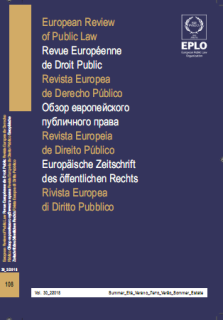
Constitutional Law / Droit constitutionnel
2017
The Netherlands / Pays-Bas
Legal Research Master’s Student at Utrecht University
The new composition of the Lower House, following the 2017 general elections, led to the formation of a new Cabinet consisting of both centre-right and centre-left parties: the conservative-liberal VVD, the conservative Christian democratic CDA, the liberal democratic D66 and the social Christian ChristenUnie. The new coalition government presented its agenda for the next four years, under the title ‘Confidence in the future’ (Vertrouwen in de toekomst), which includes the proposal to repeal the Advisory Referendum Act (Wet raadgevend referendum). In a constitutionally significant case regarding that Act, the District Court of the Hague held that it could not issue a judgment on the lawfulness of the slow response of the Government to the outcome of the referendum on the EU-Ukraine Association Agreement. This conclusion was based on the traditional reluctance of Dutch courts to interfere in the legislative process. The same reluctance led the Dutch Supreme Court in 2016 to postpone its substantive judgment on the question whether the life imprisonment sentence in Dutch criminal law is compatible with the ECHR. In 2017 the Supreme Court confirmed that the new legislation, adopted after its 2016 judgment, is ‘ECHR-proof’. The State Commission on the Parliamentary System continued its work in 2017. Its final report is expected in 2018. In the meantime, some relevant amendments to the Dutch Constitution have progressed through the rigid amendment procedure, such as an amendment on introducing a fair trial clause.
La nouvelle composition de la Chambre basse, qui a suivi les élections générales de 2017, a mené à la formation d’un nouveau gouvernement composé de partis de centre-droit et de centre-gauche: le VVD, conservateur et libéral; le CDA, chrétien démocrate conservateur; le D66, démocrate libéral; le ChristenUnie, social chrétien. Le nouveau gouvernement de coalition a présenté son agenda pour les quatre prochaines années sous le titre de “Confiance dans l’avenir” (Vertrouwen in de toekomst); il inclut la proposition d’abroger la loi sur le référendum consultatif (Wet raadgevend referendum). Dans une affaire concernant cette loi et importante du point de vue constitutionnel, la Cour du district de La Haye a estimé qu’elle ne pouvait pas statuer sur la légalité de la lenteur de la réaction du gouvernement concernant le résultat du référendum sur l’accord d’association entre l’UE et l’Ukraine. Cette conclusion était fondée sur la réticence traditionnelle des juridictions néerlandaises à interférer dans le processus législatif. Cette même réticence a amené en 2016 la Cour suprême néerlandaise à reporter son jugement de fond sur la question de savoir si la condamnation à la prison à vie prévue par le droit pénal néerlandais est compatible avec la CEDH. En 2017, la Cour suprême a confirmé que la nouvelle législation, adoptée après son arrêt de 2016, pouvait “résister à l’épreuve de la CEDH”. La Commission d’Etat sur le système parlementaire a poursuivi ses travaux en 2017. Son rapport final est attendu en 2018. Entre temps, certains amendements pertinents à la Constitution néerlandaise ont progressé à travers la procédure rigide d’amendement, comme un amendement visant à introduire une clause relative au procès équitable.





















